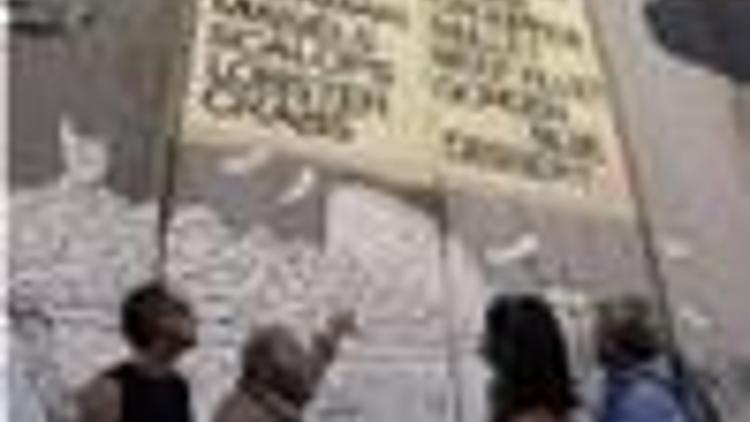Dining with view of separation barrier
Güncelleme Tarihi:

BETHLEHEM, WEST BANK - Bethlehem was once a prosperous town a few minutes' drive from Jerusalem when Bahamas opened in 1997, with Christian pilgrims traveling in droves to the traditional site of Jesus's birth and Israelis visiting the tomb of the biblical matriarch Rachel just a few hundred metres from the restaurant
The Bahamas Seafood Restaurant's menu hovers between a giant black camel and a roller-skating donkey, adding a splash of colour to the bleak concrete wall that slices through the West Bank.
"You have to make the most of what you have, even if it is negative," says restaurant owner Joseph Hasboun as he sips expresso in the so-called Wall Lounge, an extension of the restaurant affording the best views of the barrier.
The 35-year-old chef, like many Bethlehem residents, has had to find a way to live with the grim ramparts that largely encircle the town, a wall that has taken on an almost geological permanence since it was grafted onto the surrounding landscape.
"We have this wall so we made it into an advertisement," Hasboun says, proudly gesturing to the giant seafood menu across the street. "But I would prefer that the wall be removed and for everyone to come in peace."
Bethlehem
Bethlehem was a prosperous town a few minutes' drive from Jerusalem when Bahamas opened in 1997, with Christian pilgrims traveling in droves to the traditional site of Jesus's birth and Israelis visiting the tomb of the biblical matriarch Rachel just a few hundred metres from the restaurant.
Hasboun, who had moved back to his native town after spending several years in the United States, named the restaurant for the islands he had visited on a cruise from Florida in 1992.
But when the latest Palestinian uprising erupted in 2000 the area around the restaurant saw fierce clashes between Israeli troops and local gunmen, and the eatery was forced to close for the next eight years.
When it reopened in July it faced an eight-metre high concrete wall and a guard tower built to guard Rachel's tomb, an extension of Israel's controversial separation barrier that reaches deep inside Bethlehem.
"It was a negative thing for us because we have to live here, but it was better for other people because they were no longer afraid to come to the restaurant," Hasboun said.
Israelis credit the barrier with all but halting the suicide bombings and other attacks that killed scores of people at the height of the intifada.
'No one is working'
But Palestinians say it has strangled the West Bank economy by cutting off farmers from their lands and largely isolating several villages, making the creation of a viable independent state even more difficult.
To date Israel has built 57 percent of the projected 723 kilometer barrier. When completed, 87 percent of it will sit on West Bank land, according to the UN Office for the Coordination of Humanitarian Affairs.
On a recent November day Eissa, a Bethlehem tour guide, led a group of around 30 French tourists into Bahamas, where Hasboun served a lavish lunch of grilled meats and Middle Eastern salads.
"I bring them here for a lot of reasons, the wall is one of them -- so they can see the suffering," Eissa says, asking that his last name not be printed.
The number of tourists and pilgrims coming to Bethlehem -- the traditional site of Jesus's birth -- has climbed in recent years as the violence has sharply declined, but the local economy has yet to fully recover.
"The tourists can come in and eat and then go, but what about the local people?" Eissa says. "There used to be shops, supermarkets, garages in this neighbourhood. Now there is nothing. No one is working."
Hasboun does not deny that the wall has made life difficult for many of his neighbours, but says his business is doing well, attracting tour groups during the day and wealthy Palestinians in the evenings.
He offers an opulent menu that includes bacon-wrapped shrimp, fried calamari, and the house specialty, a Canadian lobster plate selling for nearly 100 dollars (80 euros) -- all imported fresh from the Israeli port of Jaffa.
"We are not just here to advertise on the wall. We make really good food," he says. The restaurant also includes a fully-stocked bar.
As the French diners waited for lunch a few of them walked outside to take pictures on the wall -- the donkey and the camel painted by anonymous graffiti artists alongside poems, political slogans and Hasboun's menu.
"It makes me very emotional, because there are so many pictures on it," says Virginia, a painter from Bordeaux, as she aims her camera at the wall. "Graphically, it is very powerful."
Inside the restaurant Roseanne, a retiree from the northern French city of Lille, says that seeing the wall has opened her eyes. "We suffer with the people. It is a chance for us to see how they live."
She confessed, however, that the food was quite good.

